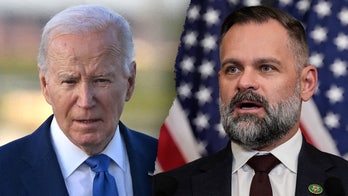
California Gov Arnold Schwarzenegger speaks at news conference in Los Angeles Wednesday, June 9, 2010. (AP Photo/Nick Ut)
SACRAMENTO, Calif. -- Gov. Arnold Schwarzenegger's order to pay 200,000 state workers just the minimum wage sent a signal to California lawmakers: In the impasse over closing California's $19 billion budget deficit, Schwarzenegger is ready to play hardball.
The Legislature's deadline to send a spending plan to the governor passed two weeks ago, and the fiscal year began Thursday with Republicans and majority Democrats no closer to finding a compromise.
Schwarzenegger's action is intended to pressure the legislative leaders to get to work so California does not repeat the cycle of IOUs and higher interest rates that have plagued it during recent budget stalemates, which sometimes have dragged on for months.
"This all goes away if the Legislature passes a budget this month," said Lynelle Jolley, a spokeswoman for the administration's personnel department.
Schwarzenegger spokesman Aaron McLear said the change should be reflected in state employees' next paycheck. Workers will be paid in full retroactively once a budget is passed.
"This is not a realistic proposal to save the state cash any more than his budget plan, which kills 430,000 jobs, is a realistic proposal to close our deficit," said Assembly Speaker John Perez in a statement. "Using working families as leverage is not the kind of leadership we need to get through this budget process."
Schwarzenegger's action also sends a signal to the state's powerful unions that represent the majority of the state's workers, that they should agree to his demands for pension reform and reductions in pay, or he will make their members' lives more difficult.
Six of the state's unions, representing about 37,000 state workers, agreed to such changes in the past two weeks. Schwarzenegger's order does not affect those workers.
Some of the state's 250,000 employees would fare even worse under the plan: doctors and attorneys are not protected by minimum wage law, so they would not get paid at all until a deal is struck, Jolley said.
The state's largest union, Service Employees International Union, which represents more than 95,000 workers, is still at the bargaining table.
The order, which was in a letter from Department of Personnel Administration Director Debbie Endsley to State Controller John Chiang, said that most state employees would be paid the federal minimum of $7.25 per hour for the July pay period. Managers who are not paid on an hourly basis would see their pay cut to $455 per week.
Chiang, who legally challenged a similar order two years ago, said he would refuse to comply, because of legal and technical issues.
Schwarzenegger's order, if implemented, could cost the state billions of dollars because the action would violate employment law, Chiang's deputy press secretary, Jacob Roper said. He cited the federal Fair Labor Standards Act, which he says entitles a worker to "double damages" if an employer cuts pay to minimum wage.
Despite the budget impasse, most lawmakers were sent home to work in their districts, another signal that a budget deal is not close.
"Governor Schwarzenegger is blaming state workers for the fact that the legislature needs a two thirds majority vote to take a bathroom break much less pass a budget," said California Democratic Chairman John Burton in a statement. "The governor's time would be much better spent convincing members of his own party to come to the table with realistic solutions instead of holding the budget hostage to their dogmatic whims."




